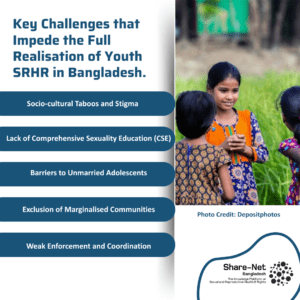From Silence to Strength: Why Youth Voices Matter in Advancing SRHR
Sexual and Reproductive Health, according to WHO, refers to a broad range of services that cover access to contraception, fertility and infertility care, maternal and perinatal health, prevention and treatment of Sexually Transmitted Infections (STIs), protection from sexual and gender-based violence, and education on safe and healthy relationships.
Having the right to a safe and respectful intimate life, being able to decide for oneself if and when to have children, having access to non-judgemental services, and not being subjected to and being protected from any form of gender-based violence are all issues that encompass Sexual and Reproductive Health and Rights (SRHR). Needless to say, youth and adolescents are the prime demographic of the SRHR landscape, as, according to the Guttmacher Institute, most adolescents become sexually active by their late teens: 40% of women in Latin America, 60% of women in sub-Saharan Africa, and 52% of women in America had sex by the age of 18.
Bangladesh, as reflected by the 3rd stage of the demographic transition resulting in a youth bulge, boasts approximately 46 million individuals aged 15-29. This group represents nearly a quarter of the total population and is a crucial demographic for the country’s future. Despite the size of this subpopulation and their unique SRH needs, the scope of SRH programming in Bangladesh has remained limited. Adolescents and youth in Bangladesh face a number of issues, including high rates of early marriage, high fertility rates, limited negotiation skills, and insufficient awareness of and information about reproductive health.
Today, we see the youth SRHR landscape in Bangladesh struggling with a series of challenges. Bangladesh stands with the 3rd highest rate of child marriage, outnumbered only by the Central African Republic and Chad. Here, the median age at 1st marriage is 16.4 years, and not to mention high rates of adolescent pregnancy, as an onset of child marriage, and a number of other factors. With a high unmet need for family planning and, albeit declining yet high rates of gender-based violence, the youth in Bangladesh at this point in time grapple with multiple SRHH issues.


Nonetheless, the power of our voice is of paramount importance, especially amongst young people in Bangladesh, to drive forward the imperative issues of sexual and reproductive health and rights (SRHR). By making their voices heard, young people can break deep-seated socio-cultural silences and close the gap that so frequently exists between them and life-saving information and services. Their direct involvement in policy formulation and programme development is not an act of tokenism; it ensures that projects are not just useful and relevant but also accessible to marginalised groups.


The key to advancing SRHR lies in empowering youth. The plan advocates for five strategic actions, including mandating comprehensive sexuality education in schools and expanding adolescent-friendly health services. It also emphasises strengthening legal mechanisms against harmful practices, leveraging digital platforms for information, and creating formal government channels to ensure genuine youth participation in policy-making. This holistic approach aims to create a more supportive and informed environment.
Sources:
- What we know and don’t know: a mapping review of available evidence, and evidence gaps, on adolescent sexual and reproductive health in Bangladesh
- Adolescents in Bangladesh: a situation analysis of programmatic approaches to sexual and reproductive health education and services
- Bangladesh Demographic and Health Survey (2022)
- POPULATION & HOUSING CENSUS 2022
- Advancing Adolescent and Youth Sexual and Reproductive Health in Bangladesh

